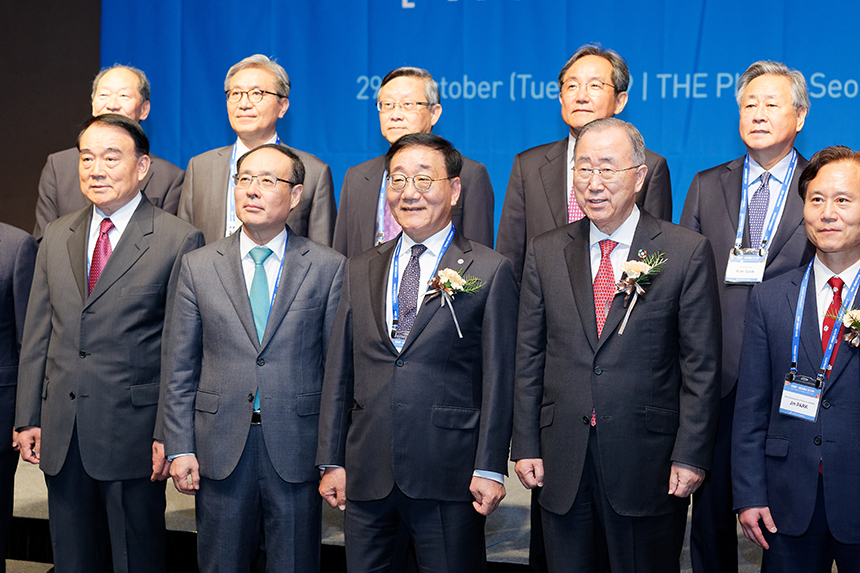- Yonsei Calls for Action to Achieve Sustainable Development Goals in Higher Education November 11, 2019
-
GEEF (Global Engagement and Empowerment Forum) X AEARU (Association of East Asian Research Universities) 2019 Forum
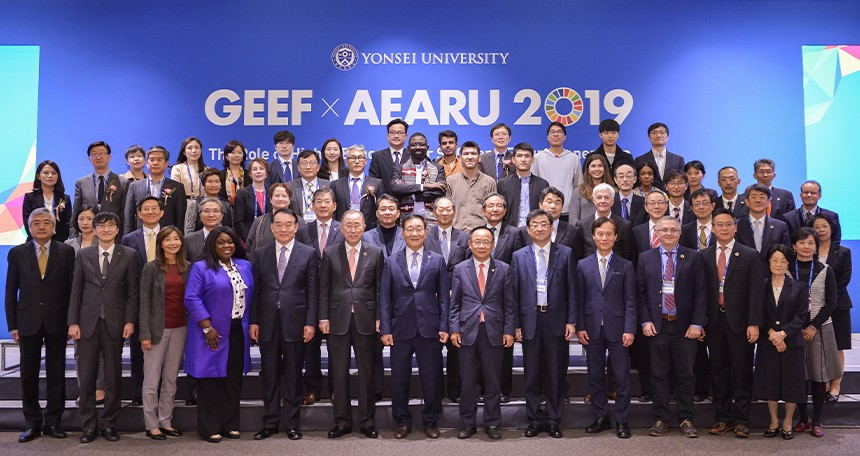
In recent years, universities around the world have been making massive efforts to address the needs of a rapidly changing world and play an acting role in guiding society towards a more sustainable future through education.
As part of these efforts, Yonsei University held the “GEEF X AEARU 2019 Forum” on its main campus in Seoul, Korea, on October 30 to discuss the roles of universities and professors for Sustainable Development Goals (SDGs) and the future direction of higher education.
The GEEF X AEARU 2019 Forum is a hybrid of two annual international events: The Global Engagement & Empowerment Forum on Sustainable Development (GEEF) held by Yonsei University where stakeholders - including global leaders and experts - convene to collaborate towards accomplishing the United Nations’ 2030 Agenda for Sustainable Development, and the Annual General Meeting of the Association of East Asian Research Universities (AEARU), a regional forum for academic exchange and cooperation among 19 leading research-oriented universities in East Asia, of which Yonsei University is a member.
By hosting the GEEF X AEARU 2019 Forum, Yonsei initiated new perspectives of academic institutions and the role of universities under the light of the SDGs in collaboration with AEARU and world-leading universities. Themed “The Role of Higher Education for SDGs and Future Generation,” the forum hosted numerous leaders in the fields of public policymaking and education who offered valuable insight into how universities and cities can best prepare the future generation to build a prosperous, sustainable future.
President Yong-Hak Kim of Yonsei University welcomed the forum participants by saying, “Today, we will re-orient the roles of academic institutions to broaden social value and contributions within societies and to reinforce the commitment to promoting sustainable development.”
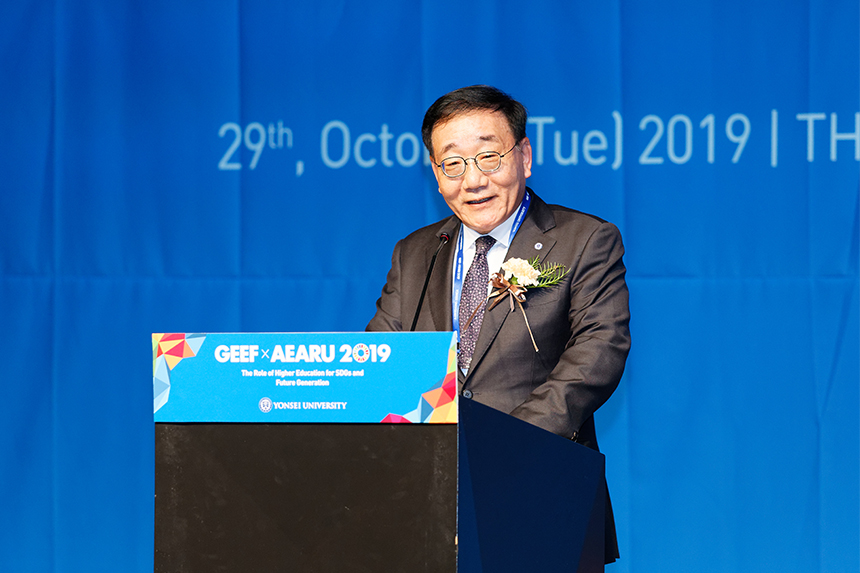 Yonsei University President Yong-Hak Kim during welcome remarks
Yonsei University President Yong-Hak Kim during welcome remarksOver 100 distinguished guests from various sectors - including the presidents of AEARU universities, former UN Secretary-General and Honorary Chair of Yonsei University’s Institute for Global Engagement & Empowerment Ban Ki-moon, Boao Forum for Asia Secretary Li Baodong, and National Assembly Deputy Speaker Ju-Young Lee - discussed various topics such as the future of university education and the role of university for a sustainable future during the forum’s opening ceremony, sessions, and special declaration signing ceremony.
Among the forum participants, a total of 17 universities participated in signing the *Declaration on Higher Education for Sustainable Development created by the University Global Compact (UGC), a “collaborative platform of globally engaged universities and higher education associations working in partnership with the UN and other stakeholders to create a more sustainable future for all.” UGC was officially launched in September 2019 at Rockefeller Foundation Headquarters in New York City, with Yonsei University as one of its founding members.
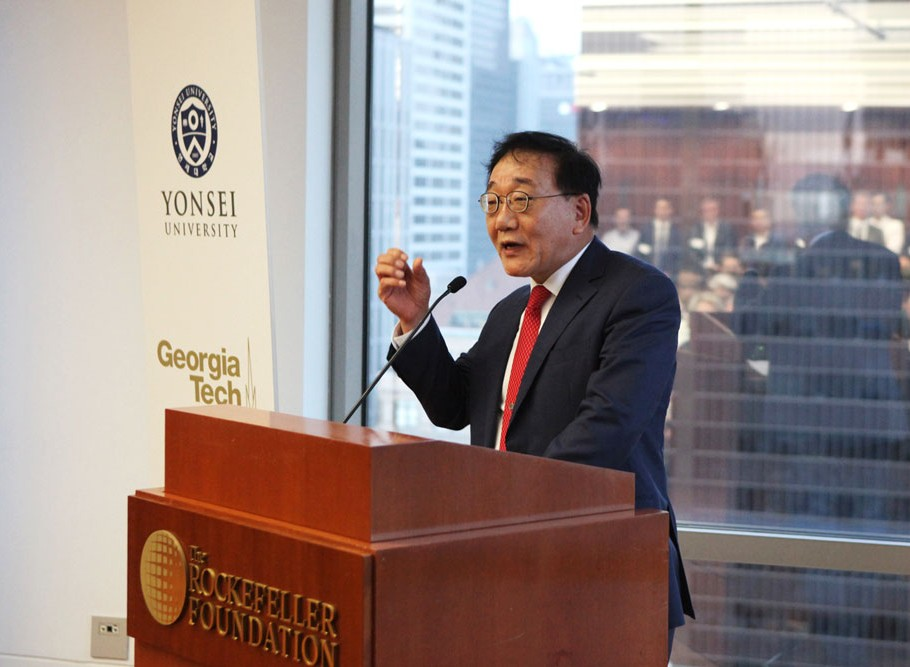
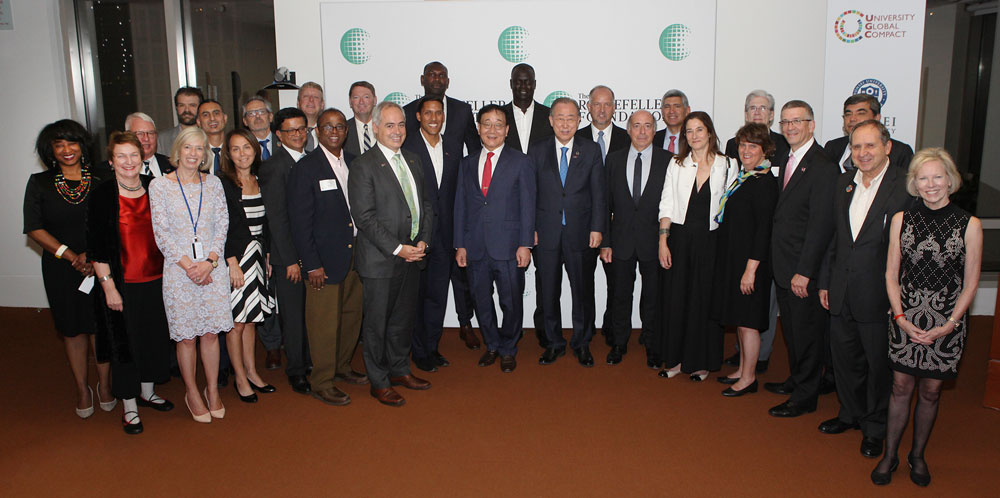
University Global Compact (UGC) launching event (Rockefeller Foundation Headquarters)
“We are here to address and discuss how our places of higher education can help build a model for societies that is not only prosperous but also protects our planet,” said Honorary Chair Ban Ki-moon during the forum's keynote speech. “Often it is in the small meetings and interactions, many of which you will have today, that the small seeds for larger partnerships are born - partnerships that can help bring a new era of cultural, economic, and social progress for East Asia and beyond.”
From architecture and urban planning to personalized lesson plans, the GEEF X AEARU 2019 Forum sessions took a holistic approach to analyze the future of education that seeks to embrace new changes and technologies that can solve the challenges faced today.
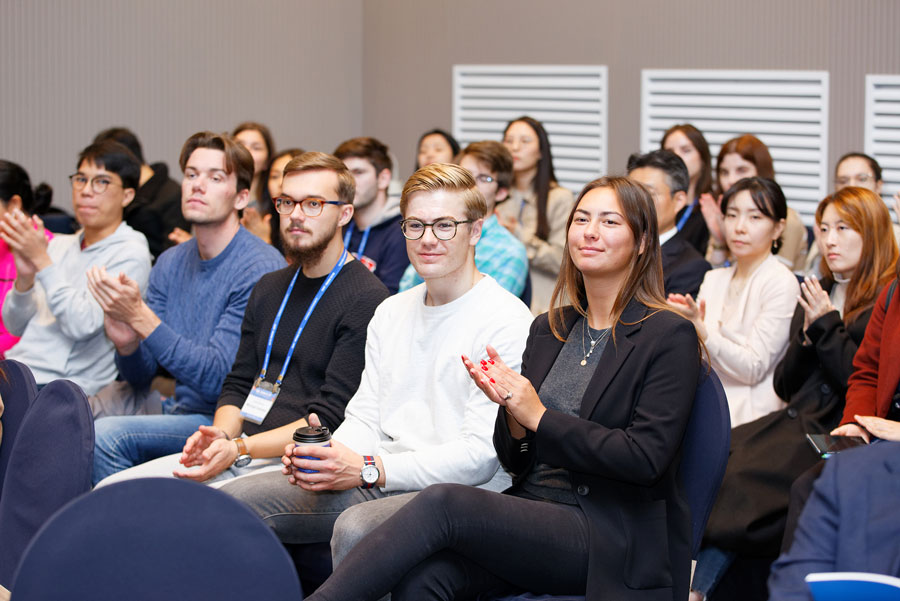
Session 1: Futures of Education
The first session of the forum focused on two key issues: how education is changing in the 21st century and how the physical aspects of a university can promote quality education. These two issues were introduced by distinguished speakers and were expanded upon by a panel of experts.
The first agenda was about the future of education and how educators can best prepare students for the Fourth Industrial Revolution. Lee Ju-Ho, professor at Korea Development Institute (KDI) School of Public Policy and former Minister of Education and Science & Technology, highlighted Korea’s success in the field of education. He emphasized that prior governments have long invested in the public education of Korean people and that this Korean system can be used as a model for education in other countries. Professor Lee went on to speak about how new technologies are changing the nature of education from mass production to mass personalization. Instead of all students following the same lesson plans on the same time scales, new technologies are making it possible to craft individual lesson plans for students.
The next speaker, Sohn Sae-hyung, professor of Architecture at Sungkyunkwan University, spoke about the importance of universities as communities and ways that new technologies can affect the architectural decision-making process. Universities have been long considered centers of knowledge and innovation. Thus, architects designing campus buildings and other campus areas should ensure that university campuses have spaces for students to interact with each other and share ideas openly.
These two speakers were followed by a panel featuring education experts from South Korea, the United STates, and Nigeria. Indiana University Provost and Executive Vice President Lauren Robel spoke about the challenges faced by Indiana University as it implements initiatives to meet the needs of students and promote sustainability. African Development University President Kader Kaneye detailed the need for universities to be more forward-thinking, pointing to a recent report by the Institute for the Future (IFTF), which stated that 85% of jobs in 2030 had not been created yet. President Kaneye also described how - due in large part to the internet - workers will no longer be contained by geography as working from home and across borders will become more common in the coming decade.
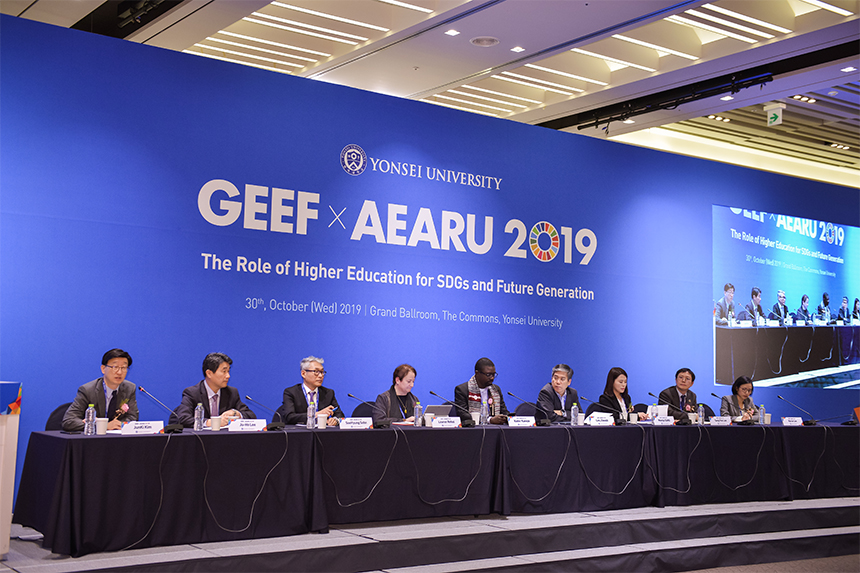
The panel made it clear that academia must embrace new ideas and technologies to properly prepare students for the challenges they will face in the 21st century. From how educators prepare and teach their lessons to how architects design campuses and promote learning environments, future education policymakers must consider a multitude of issues when planning the future of education.
Session 2: Future Cities, Future Universities
Former Under Secretary General of United Nations Wonsoo Kim began the second round of presentations as the moderator, with the session focusing on the idea of “Future Cities, Future Universities.” The presentations had a common theme of emphasizing what universities and societies should do to achieve SDGs in terms of social networks and community development.
Nam-joon Cho, professor of Materials and Engineering at Nanyang Technological University was the first speaker of the second session. Titled “Smart Campus Cities: Connecting People and Ideas with the Triple Helix Model,” his presentation discussed small campus city sustainability and future infrastructure. In 2006, the Smart City/Nation concept emerged from Singapore with the ideas of sustaining mobility, energy, water, waste, and economic development. Professor Cho talked about the hardware and software gap in today's society and the path needed to connect these two infrastructures. For example, he explained that while Silicon Valley is a city filled with talent, for a city to be a sustainable one, it needs to be built up as a “smart” city. Professor Cho ended the presentation by giving an example on the Triple Helix partnership—a joint partnership between the government (public sector), industry (private sector), and educational sector (e.g. Nanyang Technological University).
Peter Abraham, professor of Sociology at University of Copenhagen, then talked about societal roles and the direction the future may hold in his presentation, “Community, Value of Life and Social Safety Nets in Northeast Asian Cities.” He elaborated that the future is uncertain and that our future could lead to (what he predicts) a neo-liberal social dystopia and a sustainable utopia. Professor Abraham emphasized the need to use society’s resources effectively to establish a good social network that is inclusive and able to sustain its population. He said that Asia could be the focal point of social network building, but he mostly focused on Korea, stating that while Korea has been historically behind in its social programs and networks, it has been slowly building them up.
Majdi Abou Najm, professor of Land, Air and Water Resources at University of California Davis, gave a speech on how to allocate and use resources sustainably. His presentation was titled “The Future of Future Cities and the Sustainability of Land, Air and Water Resources: the Role of Academia.” Historically, human populations clustered around high resource areas; however, today as our population grows, there is an increasing need to use limited resources effectively. For example, in his city building, he suggested using nitrogen from livestock into the agriculture sector.
The session ended with a panel discussion among professors and presidents of various universities, such as Jun-ichi Takada (Vice President for International Affairs, Tokyo Institute of Technology), Sabrina Lin (Vice President for Institutional Advancement, Hong Kong University of Science and Technology), and Gbemisola A Disu (Chief Business Officer, George Mason University-Korea).
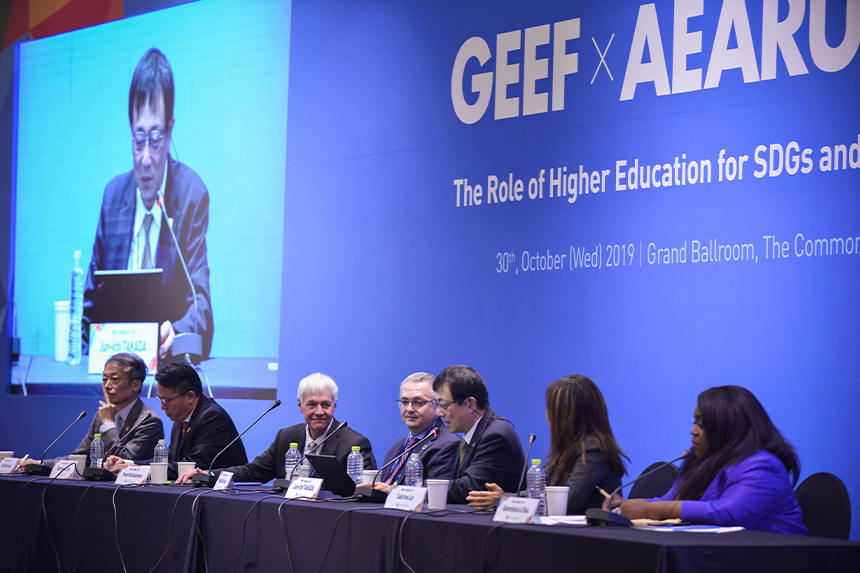
The panelists debated on the right way to approach city planning, discussing how societies could incorporate science, education, and economics to build a more sustainable future city. The panel specifically focused more on combating climate change and being sustainable via our actions, concluding that the obstacles the world will face this century will overall be decided by how the international community chooses to approach these problems and overcome them.
*Declaration on Higher Education for Sustainable Development
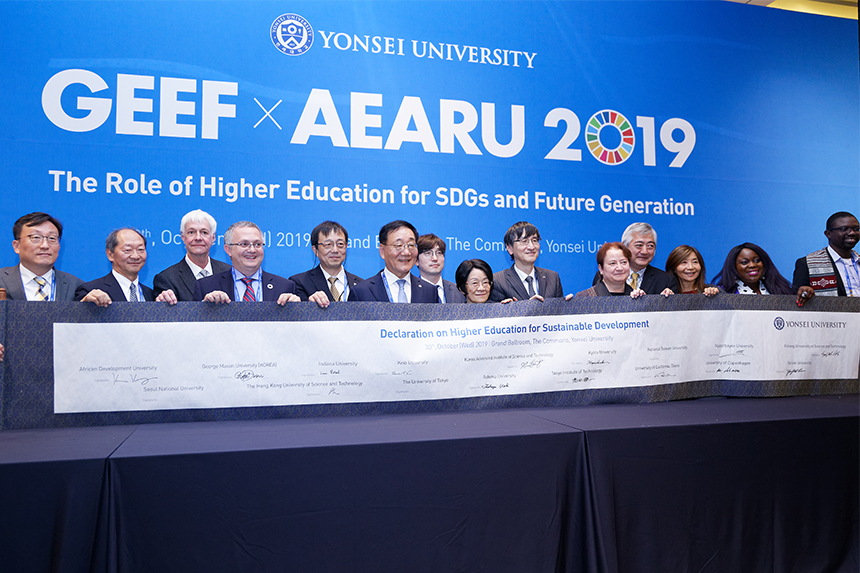 Declaration on Higher Education for Sustainable Development Signing Ceremony
Declaration on Higher Education for Sustainable Development Signing CeremonyMission:
A collaborative platform of globally engaged universities and higher education associations working in partnership with the UN and other stakeholders to create a more sustainable future for all
Commitments
1. Increasing students’ understanding of the most pressing challenges facing the world today as articulated in the Sustainable Development Goals, and inspiring students to play an active role in driving change and finding new solutions
2. Developing the global competence and leadership skills students need to effectively collaborate across cultural and national boundaries and across disciplines and sectors in creating a more sustainable future
3. Engaging in actionable research, knowledge sharing, and innovation in collaboration with other local and international organizations in pursuit of novel approaches to achieving the Sustainable Development Goals
4. Engaging with private and public actors in leading, guiding and supporting local, national and global responses to the Sustainable Development Goals
5. Recognizing the impact that our own operations have on important sustainable development issues and acting responsibly to address them and serve as an example to others
6. Communicating publicly our progress and being accountable for our outcomes
GEEF X AEARU 2019 Forum was co-hosted by Yonsei University (Office of International Affairs/IGEE), the National Assembly Futures Institute, and AEARU. The event was sponsored by the Korean National Committee for UN-Habitat and co-organized by think-tank Yeosijae Future Consensus Institute.
As an "engaged university," Yonsei University identified social engagement as one of its key missions, taking the lead in advancing knowledge transfer, creation, and innovation, as well as introducing new perspectives for problem-solving and sustainable development for the domestic and international community. To actively achieve its social engagement initiatives, Yonsei launched the Institute of Global Engagement and Empowerment (IGEE) in 2017, working to find effective ways to implement the SDGs by the United Nations within and beyond the University. Since 2018, it has been hosting a annual global event called the Global Engagement and Empowerment Forum on Sustainable Development (GEEF) every February to raise awareness of the importance of sustainable development. The 3rd GEEF will be held during February 26-27, 2020.
[Editor's Note] This article was written in collaboration with Yonsei University's student-led English monthly, The Yonsei Annals. Student reporters: Nicholas Newton, Oscar Jay
show mobile menu
mobile menu

